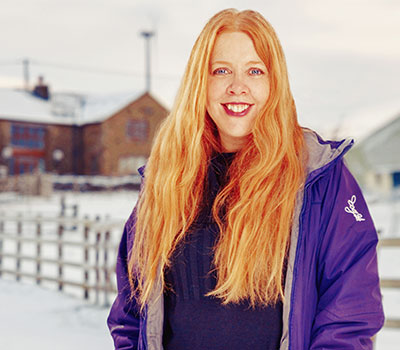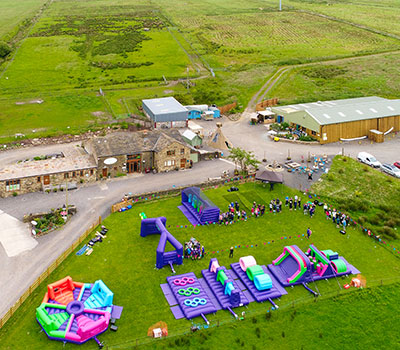The Wellbeing Farm - how Celia Gaze diversified to a wedding venue
Wheatsheaf Hill Farm is a hill farm located 800 metres above sea level in Lancashire. Originally a sheep farm, the farm diversified in March 2013 to become The Wellbeing Farm – a multi-award-winning events and wedding venue. Here, Celia Gaze – who is the founder and managing director of the Wellbeing Farm and also acts as Head Stable Maid for the Llamas – answers our editor Victoria Galligan's questions on taking the diversification leap…
Why did you decide to diversify: what was the point where you decided to take the plunge?
It was a change of career which led me to diversify. I travelled around the country visiting 196 diversified venues to understand what they were doing and how they did it. My diversification took two years of preparation before opening.

Did you take advice from any professionals about your change in direction?
There is a lot of support out there for diversification and it’s about knowing who to contact, what to expect and how to get through the diversification maze – which I suppose is exactly the purpose of Farm Diversity!
How do you manage to cope with the increased workload: do you employ more people for example?
Start small and learn the lessons as you go and then gradually grow –use an outdoor location such as a large garden, a field or even rent some land and try your idea out. You can start off with hiring a marquee or tipi in a field and hiring toilets, chairs/tables etc. and obtain a temporary events licence.
Planning permission along with business rates are the most fundamentally frustrating processes and I would highly recommend you seeking the services of a planning consultant especially if you are living in a greenbelt area.
You need a good team around you consisting of an accountant (I went through five before I found the perfect accountant), someone with marketing skills and knowledge (you may want to outsource this or learn how to do this) and then someone to run the actual business. You need systems in place for dealing with enquiries, bookings, running your operation and everything else.
What was the moment when you knew your diversification gamble had paid off?
It takes time – you need to be prepared for bad times, setting up a business in a rural area is tough. My lowest moment was December 2014 when, as a hospitality venue you should be at your peak time and I was struggling to pay a VAT bill. I felt sick – I had employed staff who were relying on me, suppliers demanding me to pay their bills, bookings which we had to deliver. I was in trouble facing a mountain of debt and I just didn’t know what to do. Something had to change.

Four years later and I won North West Wedding Venue of the Year (Countryside) at the Wedding Industry Awards, have bookings two years in advance which provides regular income throughout the year, have over 200 systems in place which allow me to run my business knowing that the consistency and quality of service remains.
What advice would you give to people thinking of starting a new diversification project?
You need to be resilient, patient and learn to love failure. It’s fantastic to be able to own a successful business but, at the same time, you need to be prepared for what you can face. During the course of my diversification, I faced nearly every type of challenge – tribunals, near bankruptcy, court hearings, staff issues, system problems and survived to tell the tale. I had to learn everything the hard way and as a result, I have written a book ‘Why Put a Bow Tie on a Llama?’ about what I learned. So if you decide to diversify your farm or land, you’ll be prepared with guidance and a source of support.
See Celia's farm diversification in action at thewellbeingfarm.co.uk
Photo: Chris McGloin
- Log in to post comments

